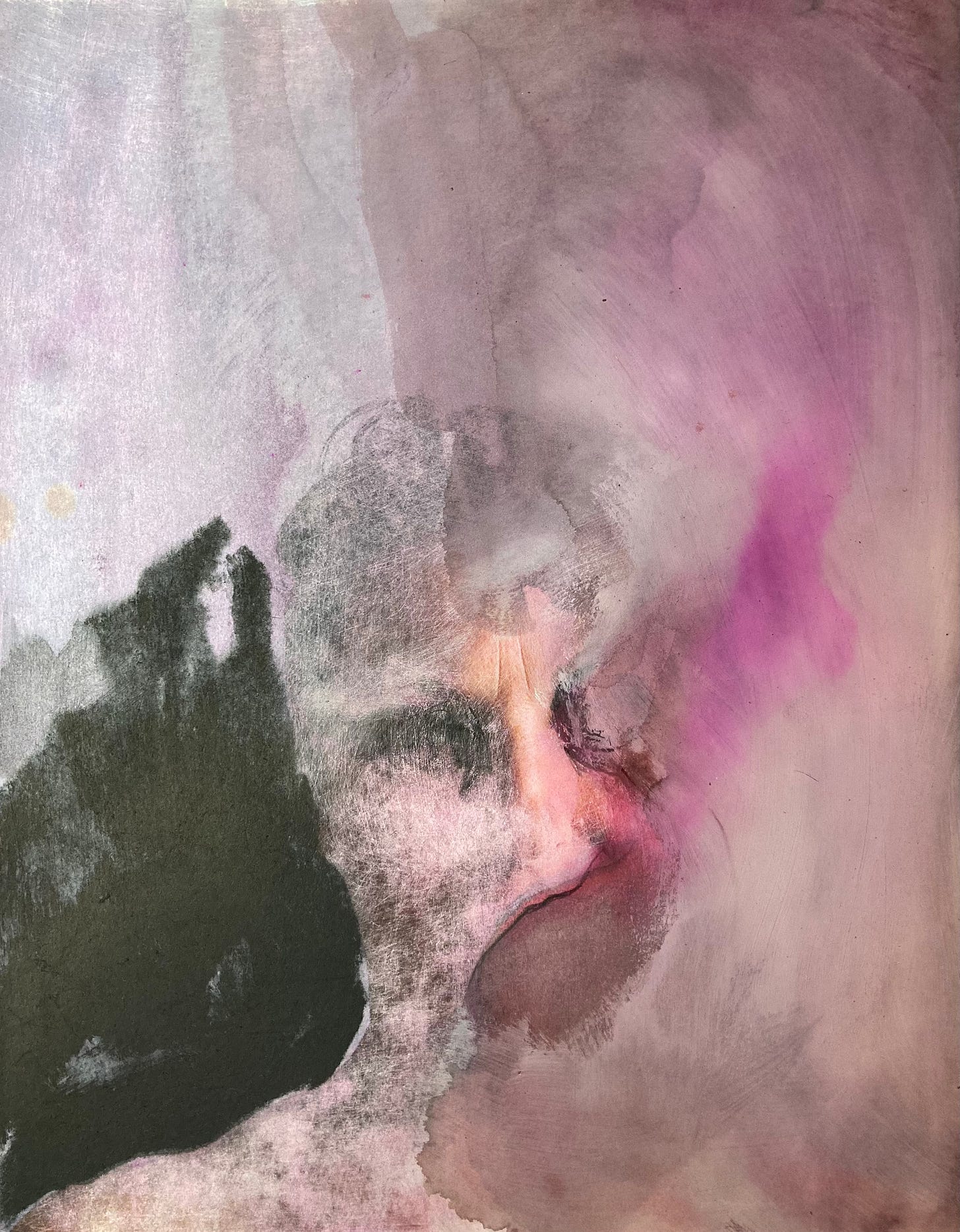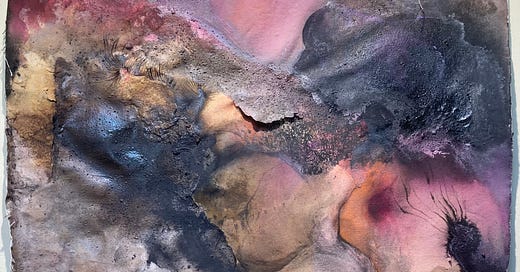Hello dear substack, I’ve missed you! I’ve missed this space to unfurl and the readers with whom to share that unfurling. For those new to This Body is a Portal, welcome and thank you so much for your time and care. I hope to be with you more often as the season turns.
Over the past few months I’ve been carried by forces and flows into spaces of wild proliferation and stagnant pools. There has been growth and decay, beautiful convergences and painful blockages. The offerings below are a collection of reflections, seasonal gestures, summer months of being and thinking with landscapes, weather, train tracks, garbage trucks, and the writings-thinkings of the people with whom I have been in conversation, some who I have the pleasure to call my collaborators and friends. Many of these words were jotted down in the moment, while sitting on a park bench reading Erin Manning’s For a Pragmatics of the Useless, at the bar scribbling in the margins of Jack Halberstam’s book Wild Things: The Disorder of Desire, in sketchbooks and the backs of drawings, text messages to friends or lovers on sleepless nights, dreamy mornings, in moments of pleasure, confusion, and strange mixes of both. The voice recording shifts the tone with the pulse of Brooklyn always around me, but I hope you can also sense into some of the less cultivated spaces that I was in, and in various ways continue to be thinking with.
Something that has been emerging for me in these past months is an ethics of being with. I don’t lay claim to any of the thoughts I share here, rather, I try to stay close, to be a sensitive register for atmospheric ideas, quiet voices and comminglings through which energies can be ecologized into other forms of welcome, invitations into sensing, together, different ways of being in relation.

July Rain
I woke up to the sound of trees shaking off a night of light rain.
It rained this morning in Brooklyn too, my friend said into the phone, describing the smell of wet potted dirt on her rooftop garden.
I’m in Ohio visiting my family, visiting the trees, the feeling of damp moss under bare feet, the scent of petrichor, the nut hatches, tufted titmice and black cap chickadees that my mom says will eat out of your hand.
Rain animates landscapes anew, washing away the familiar topographies by which we human animals navigate our physical and emotional worlds, releasing flows of melancholy and exhalations of breath held for generations, drumming pools of the erotic out from the hidden places, spilling into rhythms that exceed the capture of clock time. Rain always brings, for me, a sense of the wild into the metered urban landscape, where time has already been pre-allotted to prioritize the business of what we call human living. The flow of water decenters the flow of world-making productivity and when the rain comes down hard we have to wait, to rearrange, re-prioritize. Sometimes, we have to re-build, or, if we really listen, we learn to unbuild.

Rain challenges the story of the individual, collecting us into shifting shapes like clouds. Thoughts become atmospheric and people will readily accept pronouncements of a shared ethos without any theological leanings nor predispositions to psychic attunements. No one accuses you of magical thinking or new-age spirituality when you tell someone that you sense a collective mood gathering in a darkening sky. Rain is one of those more than human powers whose agency is unquestioned, deeply felt, and requires no languaging to presence its effects in our lives.
My friend Beatrice Marovich, in her recent substack post More Than Human Power, reflected on relationships between politics and more than human power (a phrase, now ubiquitous in eco-philosophical writing, attributed to David Abram). She writes that “more than human power is what we admire, fear, and authorize when we engage in politics in the first place. Our politics are oriented around more than human powers, whether we acknowledge this or not.” In her essay she notes the ways in which political claims to power are legitimated through the manipulation of collective emotions. Politicians (a distinction could be made here between those who seek power and those who truly embody the role of public servant) transfer the rhizomatic power of animist worldings into a power over others through taking up a position of speaking to a feeling that is “in the air”.
In the United States, I often hear the current political climate described as a pervasive atmosphere of disruption. Atmosphere, writes Erin Manning, “could perhaps be said to be that which conditions all that is relational.” This atmosphere territorializes bodies, funneling us into limited forms of relationality that deny the presence of other forms of agency and non-hierarchical power. Bayo Akomolafe refers to this funneling as a tyranny of choice, saying that it reinforces the idea that politics is an already defined territory of acting. Our participation within that predetermined territory incarcerates choice within humanist frameworks that delimit our capacity to think with other forms of living and being.
What might emerge through a politics of rain? What might we learn by tuning into the powers that spill past borders and collect in the low places? How might the collectivity of rain offer us possibilities for assembly beyond or beside an identitarian based solidarity in which turning towards is simultaneously a turning away?
August Doubts
Doubt makes us porous with the sense that there could be other ways. Certainty is a form of closure within humanist modes of being. Doubt is plural, animist, haunted. It is us inhabited by more than us. Doubt is where spirits play. Tricksters and shapeshifters. They remind us that we are always in the unknowing of becoming.
The phrase “harboring doubt” implies that doubt is fugitive, seeking protection. Perhaps in the offering of safe landings, we give doubt agency to unmake the presumptions of a static world of subjects and objects, fixed positions, making fragile the idea that we can know the shape of ourselves. Perhaps the gift of doubt is its reminder that the shorelines upon which we build our harbors are always changing, never stable but always coming into being not by naming but by an endless succession of touch, water against rock and the shape held in that infrathin space of what just was.
What harvest can come from a season of doubt? Even as I write this I struggle to find faith in my words, in what thinking or writing or art can do. I am not a faithful farmer. My tending does not return to me in provisions for the winter. It grows something that will always leave me, chewing through organ walls and tissue to make its own bloody way out. But aren’t doubt and faith both agreements to be unmoored by mystery, to be keeled by indeterminacy? What name would I give to this vertiginous free fall if I hadn’t been taught that the moving planet could be stilled by my knowing?
September Monsters
The summer carries me through late August into September with abundant vegetables in gardens and farm stands, grassy scents in expansive fields or poking through cracked pavement, in lake water warmer than the cooling night air and sudden winds that slice the smoggy skies of northern cities with surprising crispness. The season change, always churning and turning underground, now colors the light, clings to my skin, and moves me in subtle turnings, like a potted plant following the light through a window. It is also ripe with the scent of monsters.
Monsters are everywhere, not just in the hidden places. What lurks in shadow is a dark sprawl of unnamable conditions that may be bodied into monster through moments of encounter, in unexpected habitations at the edges of the familiar. I feel the breath of the monster in relational moments that limn the domestication of intimacy, exposing the artifice of “natural” states of feeling. The monster draws me queerly towards a beyond wanting, a desiring that won’t be captured by desire, a sexuality that refuses stable subjecthood through satisfaction, towards the unresolved stretching darkly towards bewilderment.

My art practice is a being-with the monster, often visually expressed through the rendering of corporeal liminality; heads blossom into ecosystems, disordered limbs tangle and transform, excesses of life grow not up but sideways, dripping, pooling, sporulating, spreading through openings and orafices, figures become ground for strange forces of livingdying. What is interesting to me about the monster is not, however, its mass of tentacles, hairy protrusions or disconcertingly soft flesh – it is the way the monster destabilizes isness, thingness, objectness. The monster is a queering in the ecotones of abstraction and representation, a refusal to resolve into shape or blur into formlessness. Monster, though grammatically treated as a noun, is always a gerund, always monstering, always shifting. To be-with the monster is a pararepresentational practice, a sideways sensing into derrangements of frameworks of perception, leakages of sensorial orders.
Monster becomes monster through transgressions, through hybridities that pervert regimes of representation and identity production. Monsters defy taxonomic order, chewing holes right through the family trees, shitting all over charts and diagrams of origins and evolutions. The monster’s becoming is devolution. Monsters announce their arrival through erotic spillages and violent ruptures of perceptual cohesion that threaten the moral order. They pulse with wildness, a wildness that Jack Halbertam describes as “the absence of order, the entropic force of a chaos that constantly spins away from biopolitical attempts to manage life and bodies and desires.” Jack describes a wildness that doesn’t exist as the binary to civilization but is something more wholly impervious to primitivist ontologies, something that serves neither utopian nor dystopian epistomologies of human nature.
The monster’s hybridity brings a double negation, a neither/nor that secretes wildness while failing to inculcate wildness as an alternative to civilizing orders. The monster isn’t a liberatory practice that will lead us to wholeness through “befriending” our ugliness. The wild disruption of the monster enlivens us to the sense that the conditions of our humanness are more profoundly and transgressively indeterminate than the dominant stories of homo sapiens have led us to embody.
I am exploring these ideas of the monster in 2 upcoming events:
a devolving sentence: art by Krista Dragomer and Sean Naftel, an exhibition at Sunny’s Bar in Red Hook, Brooklyn. The exhibition opens Friday, will be up through Red Hook Open Studios and will lead us into the spooky season.
Sunny’s Bar, 253 Conover St, Red Hook Brooklyn, 11231
Come see me there: Opening: September 20th, 5-7pm Open Studios: October 5th & 6th, 1-6pm
and
The Becoming Monster Festival, a 5 day online and in person event that I am co-creating with The Emergence Network, taking place October 30th-November 3rd.
Also,
Online Drop-In Drawing on the Senses Classes are Back! Starting the first week of October and occurring weekly unless otherwise noted.
Mondays 6:30-8:00pm EST Fridays 10:00-11:30am EST
These classes are guided explorations into drawing through open-ended experiments with modes of sensing. No drawing experience necessary.
For people new to my work, you might be interested in checking Gut Lights & Moon Shadows, available as a deck of cards or as a pdf download, both of which you can purchase through my website.
Lastly, thank you to all of you for reading this and supporting my work. I so appreciate you all and your paid subscriptions really help me with all those doubts that seek me out, with the monsters I continue to follow down all of the impossible paths.




thank you Krista. will allow these words to unsettle their way with me. i'm preferring being with the unknowns these days and appreciated the language you offered around politics.